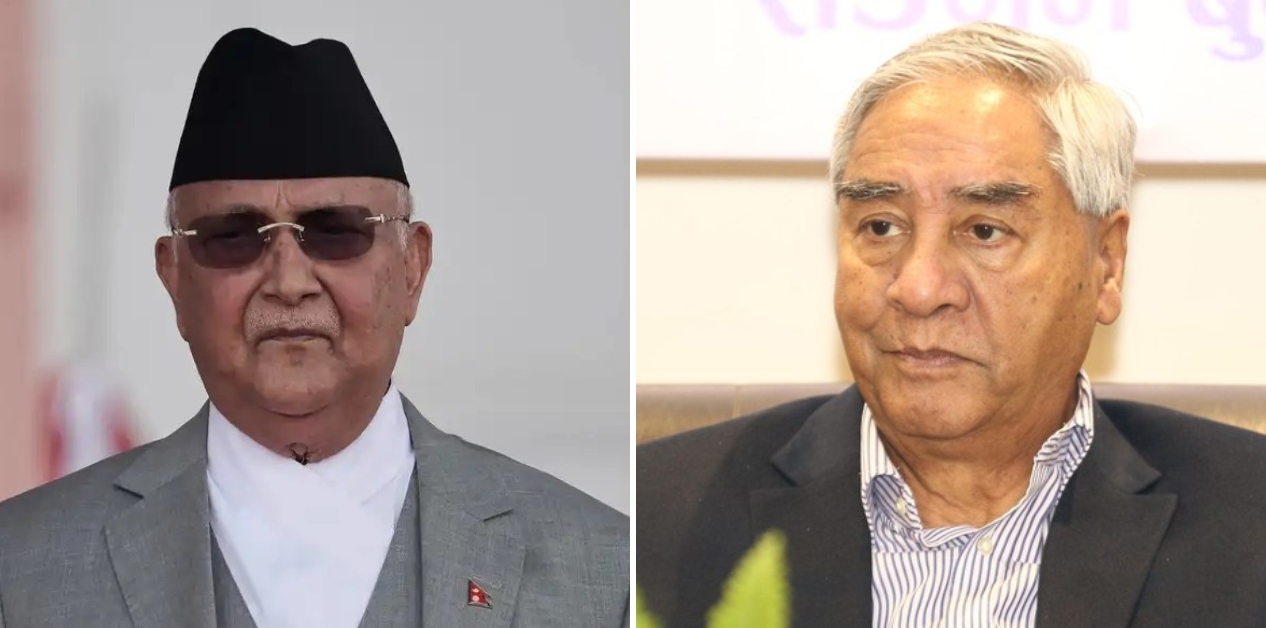

KATHMANDU: The central committee meetings of Nepal’s two oldest political parties—the Nepali Congress and the CPN (UML)—are fast approaching.
The Nepali Congress has called its meeting for October 12 at its central office, while the UML will hold its meeting from October 13 to 15.
Until September 8, both parties were part of the government. Before the dissolution of the House of Representatives, Congress and UML were the first and second largest parties, respectively.
However, both have since been ousted from power following the Gen Z uprising.
Having lost credibility, strength, and influence among the public, both parties are now facing internal and external pressure.
Yet, Nepali Congress President Sher Bahadur Deuba and UML Chair KP Sharma Oli have not relinquished their leadership, making the upcoming meetings particularly significant.
Political analyst Jainendra Jeevan says both parties have no option but to conduct rigorous self-assessment and structural reforms.
“If they don’t, both will become irrelevant,” he warns. “They must objectively evaluate the situation, decide their future direction, and prepare to hand leadership to a capable new generation.”
The upcoming central committee meetings will be crucial in determining the future of both parties.
Internal voices calling for leadership change have grown stronger.
Many insiders admit it will be impossible to win the upcoming March 5 elections under Deuba and Oli’s leadership.
Within both parties, debates continue between those demanding change and those insisting on maintaining the status quo.
In the Nepali Congress, pressure is mounting to immediately find alternatives to Deuba and his contemporaries.
The debate revolves around whether to call a regular or a special convention. However, Deuba’s faction appears reluctant to hold a special convention.
The Gen Z uprising has reshaped the political power equation, forcing both parties to consider appointing acting leadership and holding conventions to restructure themselves within a set timeframe.
The conventions are expected to decide not only new leadership but also future strategies on global shifts, technological transformations, and the economy. Hence, the upcoming meetings are expected to feature intense and time-relevant discussions.
“The meetings must focus on bringing reform within the party rather than giving old leaders another chance to regain power,” says Jeevan.
According to him, Nepali Congress must engage in discussions to empower the younger generation that understands the changing times, while UML must break Oli’s arrogance and transfer leadership to new faces.
Nepali Congress’ three strategies
Many within Nepali Congress believe the central committee meeting will determine whether the country’s oldest political force reforms or collapses.
Inside Congress, the pressure to find a replacement for Deuba and his generation is growing.
The rival faction led by Shekhar Koirala and Gagan Thapa has been pushing for leadership change and collecting signatures to call a special convention, as per the party statute that allows 40 percent of the central working committee to do so.
According to the statute, the party must hold a regular convention within four years. This means Congress should conduct its 15th convention within the next two months.
However, even the renewal of active memberships—the foundation of the convention process—has not been completed.
The timeline for new membership distribution remains uncertain. Therefore, many see a special convention as the only viable path for leadership change.
UML, too, is struggling with public perception after the Gen Z protests that claimed 75 lives during the government led by Prime Minister Oli and Home Minister Ramesh Lekhak.
Nepali Congress central committee member Madhu Acharya says the party is preparing to present three strategies at the upcoming meeting.
The first is to amend the statute as needed and complete the regular convention by mid-December through a flexible fast-track process, then focus fully on party activities and election preparations from January.
The second strategy is to unanimously decide through the central working committee to call a special convention by December to set new policies, leadership, and programs.
The third strategy is that if the central committee fails to announce either a regular or special convention by December, more than 40 percent of convention representatives will exercise their statutory right to demand a special convention.
“In the current situation, Nepali Congress cannot regain public trust or win elections. Therefore, the central committee meeting must decide to modernize the party and achieve results quickly through systemic reforms and good governance,” Acharya emphasized.
UML’s fear and internal struggle
CPN (UML) insiders admit the party faces difficulty reaching out to the public, especially since 75 people were killed during the Gen Z uprising under Oli’s leadership.
Social media trends continue to demand legal action against him for the killings.
Even after the completion of the party’s statute convention in early September, calls persist to hold the 11th general convention and retire Oli and his generation.
Many believe the UML will face a humiliating defeat in the March 5 elections if Oli continues to lead.
Senior leaders such as Surendra Pandey, Yubaraj Gyawali, Yogesh Bhattarai, and Gokul Baskota are pushing to find his replacement.
Meanwhile, Oli is reportedly working to weaken the upcoming meeting and suppress dissent.
UML central committee member Arvind Singh says the party has yet to decide whether to accept the political changes brought by the Gen Z uprising.
He adds that discussions are ongoing about whether events such as the reinstatement of Parliament will benefit or harm the party.
He believes the meeting must focus on public psychology and social expectations.
Singh argues that the leadership refuses to take responsibility for the uprising, blaming everything on foreign conspiracies and NGO interference to shield Oli and his close allies.
“Many central committee members remain silent due to the influence of secretariat officials and fear of repercussions if they criticize Oli,” he reveals.
He adds that provincial lawmakers and proportional central committee members often stay quiet, while officials limit discussions to secretariat meetings.
“Central committee members must analyze all issues deeply and raise them openly. Otherwise, both the party and the leftist movement could face collapse,” Singh warns.